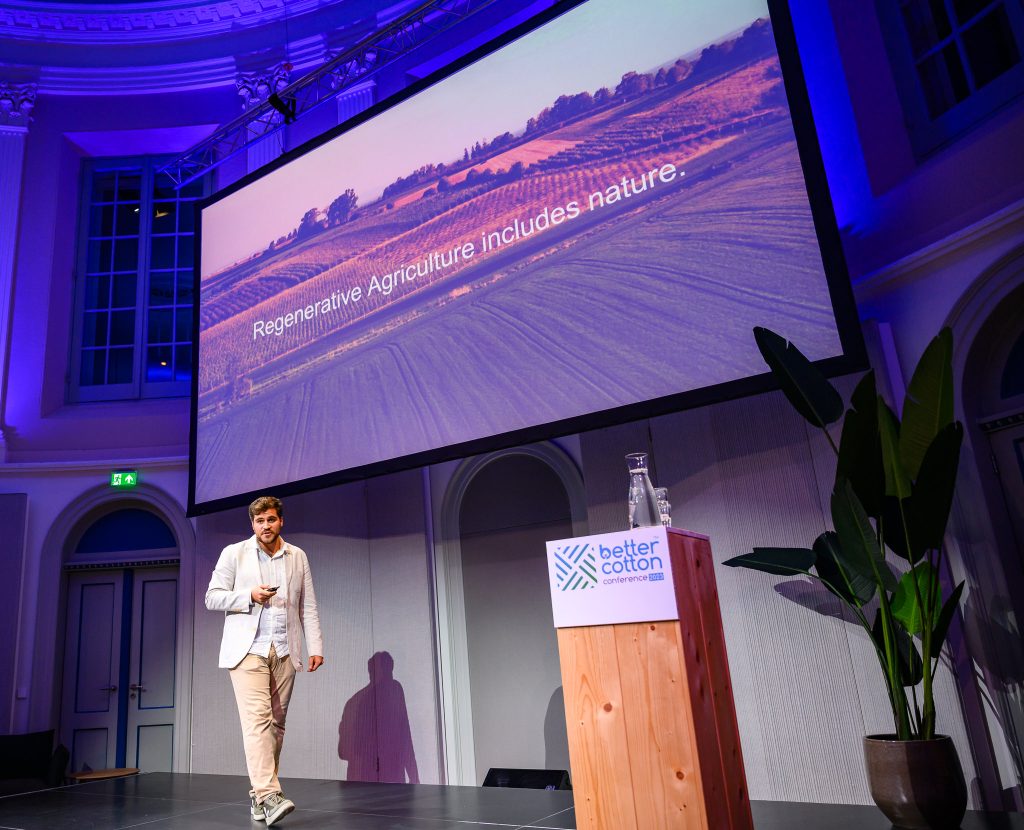The second day of the conference featured a keynote address by Maxine Bédat, the founder and director of New Standard Institute, focusing on the theme of traceability and data. The discussions revolved around the role of data in consumer-facing communications and the upcoming launch of Better Cotton’s own traceability system, emphasising its potential for positive impact.
The final theme of the conference was regenerative agriculture, introduced by keynote speaker Felipe Villela, co-founder of the sustainable farming foundation reNature. Attendees had the opportunity to learn from cotton farmers from different parts of the world about their unique experiences with regenerative practices.
An interactive session encouraged delegates to explore the potential of regenerative agriculture from the perspective of various actors within the supply chain – and what they will do personally to ensure that the approach can scale up.

Five Key Takeaways from Day 2
Inspirational leaders, farmers, traders, manufacturers and more took the stage to share their stories and ideas. Here are some key takeaways:
We need to embrace uncomfortable conversations, regulatory support, and proactive leadership
Understanding the challenges faced by farmers, particularly the unpredictable nature of weather-dependent income, is essential. To truly make progress, we must engage in uncomfortable conversations, and becoming more sustainable requires regulations and laws to address market failures, making sustainability a legal requirement and preventing it from being a competitive disadvantage. Embracing sustainability projects should become the norm, with companies leading the way through advocacy and other proactive measures.
Collaboration in the supply chains is needed to make traceable Better Cotton happen
Traceability drives compliance, collaboration, and connection within the supply chain and strengthens labour standards. Collaboration within the supply chain is essential to implement a traceability system that connects organisations, benefits farmers, and fosters a closer relationship between retailers and their sourcing community.
Aligning data, tools, customer demands, legislation, cost considerations, and equitable compensation are vital for measuring impact and advancing sustainability
Aligning around data is challenging, different tools provide baselines while customer preferences and legislation also influence data requirements. Understanding the purpose and context of data use informs collection strategies and long-term commitments are necessary for effective reporting.
Regenerative agriculture can ensure that farming can contribute to and benefit nature and society
We must embrace the concept that farming can have a positive effect on nature and society rather than deplete it. Practices like cover cropping, green soil coverage, and livestock integration are some of the tools that regenerative agriculture can provide to this a reality – and they can bring financial benefits to farmers too. However, the push towards regenerative practices must be inclusive of all farming contexts – including, of course, smallholders.
There is still a significant amount to learn and comprehend about regenerative agriculture
The definition of regenerative agriculture and the methods that constitute it are still being explored and understood. More collaborative work is required to achieve a comprehensive understanding and establish a common ground for measuring outcomes in regenerative agriculture. Relying on scientific research and data is essential to enhancing our understanding of this approach. However, the true inspiration lies in experiencing regenerative agriculture first-hand by listening to farmers’ experiences themselves and witnessing the results.
We express our gratitude to all the speakers and attendees for actively contributing to the success of today and to this year’s conference!







































